Kelly Jensen's Blog, page 120
March 2, 2014
Why Talking About Girl Reading Matters
Last week, I tweeted about something that I've been thinking about for a long time.
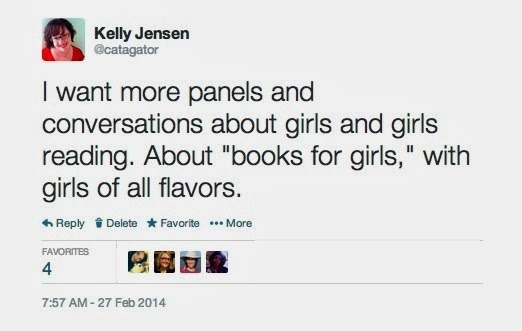
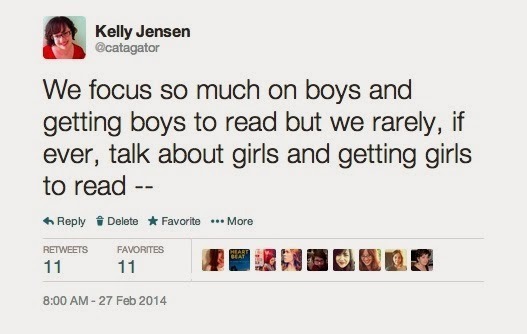
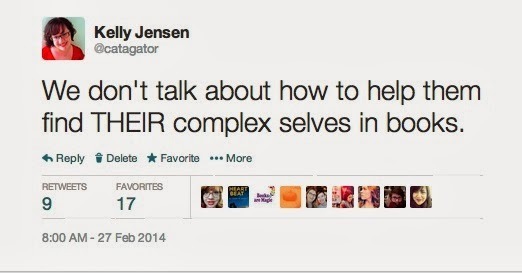
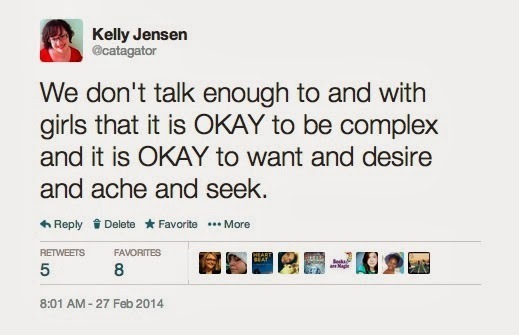
I pulled those tweets together and posted them over on tumblr while it was fresh on my mind. The conversation itself came out of reading yet another series of reviews of various YA books where a critique of the story was that the main character/s -- female -- was/were "unlikable." I won't go into a discussion of likability because I've talked about that before and because a couple of posts I've got coming later this month will be tackling this head on. But what I will say is that likability is not only a complex topic -- what does it mean, exactly, and how can you point to a character as being definitively likable or not? -- but that it's not a lens through which you can fairly critique a story. It's a preference you have as a reader.
Just as you'd prefer reading a YA novel to, say, an adult western, whether you enjoy a story with a likable character or not is also a preference. A critique of the character's likability is worthwhile when it can be laid against the plot, against the character's arc, or against any of the other means of the story progressing from point A to point B. Likability matters through the context of the story's success.
But to the bigger point.
After reading through the reblogs of my tumblr post, many of the reasons I initially tweeted about why valuable it'd be if we talked more about girls and girls reading were reconfirmed. Notes stated by suggesting we talk about girls and girl reading habits, I'm saying that there's no need to talk about boys or boy reading. That it's being entitled to suggest as much. That because boys are often behind in reading or find reading for fun an activity they choose to partake in less frequently than girls, we should be focused entirely on them because the girls will just do it anyway.
That's actually the point, but it misses the point.
Laurel Snyder wrote an excellent post a couple of weeks ago: boys will be boys and girls will accommodate. She talks a lot about the problems of labeling books "boy books" and other books "girl books" and how from the age we begin teaching and encouraging reading, we pay special attention to make sure we get books that boys will like and in doing so, we expect girls to read them too. We don't look for books that will have special interest for girls because the assumption is girls are readers and thus will just read anything (of course, there's a bigger issue at play here, but take it at that level).
I'm an advocate of getting boys to read. I'm an advocate of making sure that books with special appeal to boys -- those books with action, adventure, twists, turns, depths, non-fiction titles -- get in the hands of boys. I've talked at length here before about how there is research showing boys read less frequently than girls and that boys do tend to lag behind in terms of their reading skills in school. I think what people like Michael Sullivan are doing in educating librarians and teachers about how to best reach boys is excellent and insightful and the kind of professional development that's not only necessary, but it's expansive. This is work that you build upon, rather than pay attention to during a professional development day and move on from.
But it's also expansive because it's the kind of work that should make you think about the other side of the equation.
What about the girls?
Girls are better readers. Girls are going to read whatever you give them. Girls have so much more catering to their interests than boys do, especially in YA. These are all statements rampant throughout the reading world, but they're not substantiated in the same way the statements about boys and boy reading are. Just look at a lineup of panel sessions at major book- education- and library- related professional development opportunities: there are sessions for reaching boys, but there are rarely, if ever, sessions for reaching girls.
Part of why this is a passionate area for me is because I see reviews that call out likability as a factor for dinging a book. It's always a girl who is unlikable, rarely if ever a boy -- and if it is a boy, it's generally qualified. He's unlikable but he's also mentally ill. He's unlikable but he's also got a tough home life. He's unlikable but he's just a bad boy.
Girls, on the other hand, are unlikable. They have girl problems. They have girl drama (drama, always drama). They are girls in crisis, rather than girls living through the challenges they have to confront in order to be their best selves. In so many of the books that tackle these challenges, girl is a qualifier.
I wonder if we talked more about girls and how they're represented in books, if we'd use the qualifier less.
I wonder if we talked more about girls and how they're represented in books, if we'd allow girls to see that their problems are real, legitimate issues and that having them and working through them is not simply part of being a girl, but part of being a person.
Girls are as complex as boys, but so often, we let girls be placed into one of two categories, based entirely on our preferences: likable or unlikable. These aren't critiques of story nor are they critiques of character. They are preferences. There's nothing wrong with preferring a likable or unlikable character, but there is something wrong when that becomes the means through which we critique a story and thus the way that we then present those stories to readers -- especially to girl readers who may identify as unlikable or as likable vis a vis those books.
When we critique books and discuss books through that un/likable dynamic, we deny complexity to not just the girls on the page, but we deny girls reading those books complexity, too. We make a judgment on the actions both in the fictional world and in the real world.
I want girls to read books and know that the decisions those characters make are dependent entirely upon the characters and the opportunities presented to them in the story. I want girls to know that the decisions they have to make are dependent entirely upon themselves and the opportunities presented to them in their lives and worlds. That being likable and being nice aren't the reasons to be making choices, but rather, that being likable and being nice are choices that they get to make as they work through what it is they need to work through.
We don't tell girls enough that their lives are theirs and the decisions they get to make are theirs to make. We expect them to accommodate in every situation -- if they're not accommodating boys, they're doing worse by accommodating other girls. Or rather, they're accommodating our preconceived notion of what a boy is and what a girl is. They're accommodating ideals impossible to accommodate, ideals that deny everyone, regardless of gender and the idea of gender in and of itself, complexity.
We don't tell girls that they can want things and they can not only want things, but they can go after them. That their lives are theirs to shape into the fashion they want to. That their pain and ache and being denied opportunities or chances matters and is something they should care about. That those are things they're allowed to experience and have and do something with. We don't encourage them enough to follow up, follow through, ask questions, to be hard or unrelenting.
I wonder if we talked more about girls and how they're represented in books, if we'd see more memory in regards to the women who helped shape literature itself. More specifically, would we see more of the contributions of women in the YA world? Would more ladies who laid the tracks down to make YA what it is today be see as foundational? As important? As creators of a category of fiction that's become not just popular, but really damn good?
It was a woman who is credited for creating YA as a category. It's women who continue to shape YA and continue to present stories of complex, challenging girls -- those who fall all along the range of likable and unlikable -- and it's women who continue to challenge what YA is all together. Who continue to write to and for girls who have never seen themselves in the pages but who would not only benefit from it, but who would better see that they are allowed to be who it is they are. That they are so much greater than likable or unlikable. That making mistakes, falling down, and getting hurt are part of the process of becoming.
By wanting more for girls, by hoping that we can talk about girls and the representation of girls more, that's not a call to take away from boys. It's not a statement that boys don't matter. It's certainly not entitlement.
Rather, it's a call to continue a conversation and take it deeper. To look at what's out there and how we can make the reading world -- and thus the greater world -- a place where "girl" isn't an adjective or an adverb, but a noun full-stop.






 Related StoriesThe Male Voice in Contemporary YA Fiction: Guest Post by Steve Brezenoff (Brooklyn Burning, Guy in Real Life)
Related StoriesThe Male Voice in Contemporary YA Fiction: Guest Post by Steve Brezenoff (Brooklyn Burning, Guy in Real Life)




I pulled those tweets together and posted them over on tumblr while it was fresh on my mind. The conversation itself came out of reading yet another series of reviews of various YA books where a critique of the story was that the main character/s -- female -- was/were "unlikable." I won't go into a discussion of likability because I've talked about that before and because a couple of posts I've got coming later this month will be tackling this head on. But what I will say is that likability is not only a complex topic -- what does it mean, exactly, and how can you point to a character as being definitively likable or not? -- but that it's not a lens through which you can fairly critique a story. It's a preference you have as a reader.
Just as you'd prefer reading a YA novel to, say, an adult western, whether you enjoy a story with a likable character or not is also a preference. A critique of the character's likability is worthwhile when it can be laid against the plot, against the character's arc, or against any of the other means of the story progressing from point A to point B. Likability matters through the context of the story's success.
But to the bigger point.
After reading through the reblogs of my tumblr post, many of the reasons I initially tweeted about why valuable it'd be if we talked more about girls and girls reading were reconfirmed. Notes stated by suggesting we talk about girls and girl reading habits, I'm saying that there's no need to talk about boys or boy reading. That it's being entitled to suggest as much. That because boys are often behind in reading or find reading for fun an activity they choose to partake in less frequently than girls, we should be focused entirely on them because the girls will just do it anyway.
That's actually the point, but it misses the point.
Laurel Snyder wrote an excellent post a couple of weeks ago: boys will be boys and girls will accommodate. She talks a lot about the problems of labeling books "boy books" and other books "girl books" and how from the age we begin teaching and encouraging reading, we pay special attention to make sure we get books that boys will like and in doing so, we expect girls to read them too. We don't look for books that will have special interest for girls because the assumption is girls are readers and thus will just read anything (of course, there's a bigger issue at play here, but take it at that level).
I'm an advocate of getting boys to read. I'm an advocate of making sure that books with special appeal to boys -- those books with action, adventure, twists, turns, depths, non-fiction titles -- get in the hands of boys. I've talked at length here before about how there is research showing boys read less frequently than girls and that boys do tend to lag behind in terms of their reading skills in school. I think what people like Michael Sullivan are doing in educating librarians and teachers about how to best reach boys is excellent and insightful and the kind of professional development that's not only necessary, but it's expansive. This is work that you build upon, rather than pay attention to during a professional development day and move on from.
But it's also expansive because it's the kind of work that should make you think about the other side of the equation.
What about the girls?
Girls are better readers. Girls are going to read whatever you give them. Girls have so much more catering to their interests than boys do, especially in YA. These are all statements rampant throughout the reading world, but they're not substantiated in the same way the statements about boys and boy reading are. Just look at a lineup of panel sessions at major book- education- and library- related professional development opportunities: there are sessions for reaching boys, but there are rarely, if ever, sessions for reaching girls.
Part of why this is a passionate area for me is because I see reviews that call out likability as a factor for dinging a book. It's always a girl who is unlikable, rarely if ever a boy -- and if it is a boy, it's generally qualified. He's unlikable but he's also mentally ill. He's unlikable but he's also got a tough home life. He's unlikable but he's just a bad boy.
Girls, on the other hand, are unlikable. They have girl problems. They have girl drama (drama, always drama). They are girls in crisis, rather than girls living through the challenges they have to confront in order to be their best selves. In so many of the books that tackle these challenges, girl is a qualifier.
I wonder if we talked more about girls and how they're represented in books, if we'd use the qualifier less.
I wonder if we talked more about girls and how they're represented in books, if we'd allow girls to see that their problems are real, legitimate issues and that having them and working through them is not simply part of being a girl, but part of being a person.
Girls are as complex as boys, but so often, we let girls be placed into one of two categories, based entirely on our preferences: likable or unlikable. These aren't critiques of story nor are they critiques of character. They are preferences. There's nothing wrong with preferring a likable or unlikable character, but there is something wrong when that becomes the means through which we critique a story and thus the way that we then present those stories to readers -- especially to girl readers who may identify as unlikable or as likable vis a vis those books.
When we critique books and discuss books through that un/likable dynamic, we deny complexity to not just the girls on the page, but we deny girls reading those books complexity, too. We make a judgment on the actions both in the fictional world and in the real world.
I want girls to read books and know that the decisions those characters make are dependent entirely upon the characters and the opportunities presented to them in the story. I want girls to know that the decisions they have to make are dependent entirely upon themselves and the opportunities presented to them in their lives and worlds. That being likable and being nice aren't the reasons to be making choices, but rather, that being likable and being nice are choices that they get to make as they work through what it is they need to work through.
We don't tell girls enough that their lives are theirs and the decisions they get to make are theirs to make. We expect them to accommodate in every situation -- if they're not accommodating boys, they're doing worse by accommodating other girls. Or rather, they're accommodating our preconceived notion of what a boy is and what a girl is. They're accommodating ideals impossible to accommodate, ideals that deny everyone, regardless of gender and the idea of gender in and of itself, complexity.
We don't tell girls that they can want things and they can not only want things, but they can go after them. That their lives are theirs to shape into the fashion they want to. That their pain and ache and being denied opportunities or chances matters and is something they should care about. That those are things they're allowed to experience and have and do something with. We don't encourage them enough to follow up, follow through, ask questions, to be hard or unrelenting.
I wonder if we talked more about girls and how they're represented in books, if we'd see more memory in regards to the women who helped shape literature itself. More specifically, would we see more of the contributions of women in the YA world? Would more ladies who laid the tracks down to make YA what it is today be see as foundational? As important? As creators of a category of fiction that's become not just popular, but really damn good?
It was a woman who is credited for creating YA as a category. It's women who continue to shape YA and continue to present stories of complex, challenging girls -- those who fall all along the range of likable and unlikable -- and it's women who continue to challenge what YA is all together. Who continue to write to and for girls who have never seen themselves in the pages but who would not only benefit from it, but who would better see that they are allowed to be who it is they are. That they are so much greater than likable or unlikable. That making mistakes, falling down, and getting hurt are part of the process of becoming.
By wanting more for girls, by hoping that we can talk about girls and the representation of girls more, that's not a call to take away from boys. It's not a statement that boys don't matter. It's certainly not entitlement.
Rather, it's a call to continue a conversation and take it deeper. To look at what's out there and how we can make the reading world -- and thus the greater world -- a place where "girl" isn't an adjective or an adverb, but a noun full-stop.







 Related StoriesThe Male Voice in Contemporary YA Fiction: Guest Post by Steve Brezenoff (Brooklyn Burning, Guy in Real Life)
Related StoriesThe Male Voice in Contemporary YA Fiction: Guest Post by Steve Brezenoff (Brooklyn Burning, Guy in Real Life)
Published on March 02, 2014 22:00
February 27, 2014
Recent YA Reads
I'm in the midst of a reading slump. It's not surprising me or frustrating me much, though, because I know it's related to having finished a year of non-stop reading, and I know it's also related to what happens when I find myself wanting to blog and write a lot more. Sometimes, my energy can only go so far, and when I've put in hours of writing, reading isn't always the most appealing to me after.
That said, I have gotten a few reads in recently, and I've been rearranging my to-read pile so I can get excited again when the time comes. Here's a look at two books I read recently that didn't wow me but I also didn't dislike entirely, which I guess makes this post two "eh, they're okay" reviews.
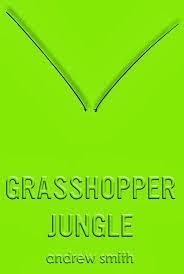 Grasshopper Jungle by Andrew Smith -- available now
Grasshopper Jungle by Andrew Smith -- available now
I didn't love this book. In fact, I'm not sure I enjoyed the reading experience at all. But I kept reading it and finished it because it's kind of like abstract art: you look at it to appreciate how it comes together but that doesn't mean you have to appreciate it beyond the way it was constructed. There's a story about bisexuality here, and it's woven into a story about the end of the world, about world history, about local history, and about family history. There are also giant grasshoppers and there is non-stop talk from Austin about how horny he is and how everything turns him on.
Is it well-written? Yes. Is it weird and different? Yes.
The thing is, beyond the fact this story tackles so much -- and it does tackle some hugely important issues -- I didn't necessarily think it was all that risky or interesting. Austin being a boy allowed him to do and say and act upon a lot of things that, were Austin a female character, would have never happened and would have been a lot more risky and interesting to me as a reader. That's not to undermine the really powerful story of sexuality here. But I couldn't help thinking about the fact no female character could have Austin's story, either. A girl who would dare talk about her physical needs this much wouldn't be embraced in the same way Austin is. Perhaps this was an unfair thought to keep having, but I also don't think it's a thought unmerited by the story itself. A lot of what Austin does and says and observes about the females in this book made me uncomfortable. They were true to his voice, but the fact there is not one girl in the story who isn't either a middle age woman on drugs to make her happy OR an object of sexual fascination to him left me feeling a little cold and tired. Not to mention she had no agency herself. I know it's Austin's perspective and how skewed that is, but I really wanted more of Shann than I got.
There were also times when author voice insert became too obvious for me. Austin was smart and funny, but I had a hard time buying Austin would so remove himself from his situation to make observations that certain names were "very Iowa." That was author humor over character humor and those moments pulled me out of the story a bit.
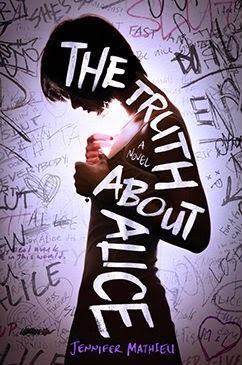
The Truth About Alice by Jennifer Mathieu -- available June 3
This review contains spoilers, and I know that reviewing this early out isn't always the most helpful thing in the world. But again, reading slump, and I picked this one up because it was a shorter read. Feel free to skip this and come back since it'll spoil much of the book.
This is a book about how Alice was branded a slut because a few nasty people in small town Healy, Texas decided to spread rumors to save themselves and their own reputation. It's all done without giving Alice a voice, which is effective in being a he said-she said story. But it's all telling with little showing. Yes, you see cruelty (like when Kelsie, Alice's former best friend, chooses to sharpie the walls of a bathroom stall calling Alice a variety of names), but you are also told repeatedly things that would be better serviced by stronger writing, more development of characters, and deeper investment in the story in and of itself. Because in every chapter, rather than seeing how Healy was a small town, we were reminded that Healy was a small town. You could walk from x place to y place. Healy was a small town. This person knew this person. While fine and great, actually reading it on the page, with some detail, would have actually shown the reader this sufficiently enough not to need to be reminded. And I think part of the dependence upon that was because there wasn't a whole lot of story here to be told.
Is this effective in showing how awful people are? Absolutely. It does to the reader pretty much what happened to Alice. She has no voice and no control, and we as readers see no voice and have no control over what happens.
But why do I CARE about Alice? I do because other people are awful and that's it. Because Kurt, the nerdy boy who wants to get close to Alice because of a long-time crush, is the only okay character in the story. But because his interest in her is romantic, and unabashedly so, I'm still not keen on his motivations or his own character. In the end, when the revelation is that Alice kept seeing him for tutoring and forgave him for keeping a secret from her emerges, we're supposed to buy that this is meant to be a new, fresh friendship for her. But I don't buy it: Kurt was in it from the start because of romantic feelings. So as much as it looks like it's FRIENDSHIP in the end, Alice's lack of voice throughout and Kurt's lack of voice following her one opportunity to talk, I still see it as a boy saving a girl in a way that's cast as romantic. It's a trope that appears again and again, and it's not fresh here.
Also, the abortion storyline with Alice's former best friend didn't work for me. It actually painted Alice in a poor light, since she is the reason Kelsie tells us she decided to sleep with that boy one time and wound up pregnant in that one sexual encounter. But again -- Alice's lack of voice lets this happen. There was also a weird message there with the pregnancy/abortion storyline and how it butts up against Kelsie's mother's devotion to faith.
There are better bullying books. There are better books about girls shamed for their sexuality. There are better books about small towns and rumors. At times the writing feels a little too adult-trying-to-write-teens and at times when the writing is just...Kurt uses the phrase "rear end" to describe a part of Alice's body which even for someone as nerdy and intelligent as he tells us he is, I have a hard time thinking a 16 or 17 year old boy with a raging crush on her would say.
Had Alice had a voice in this book, it would have been more compelling, with more depth, and probably could have gone from an okay read to a great one. But in many ways, as much as it's often smart to have the reader's experience mirror Alice's, it also feels a little manipulative and co-opts her story here.
Review copies received from the publisher.






 Related StoriesEnders by Lissa PriceCruel Beauty by Rosamund HodgeBright Before Sunrise by Tiffany Schmidt
Related StoriesEnders by Lissa PriceCruel Beauty by Rosamund HodgeBright Before Sunrise by Tiffany Schmidt
That said, I have gotten a few reads in recently, and I've been rearranging my to-read pile so I can get excited again when the time comes. Here's a look at two books I read recently that didn't wow me but I also didn't dislike entirely, which I guess makes this post two "eh, they're okay" reviews.
 Grasshopper Jungle by Andrew Smith -- available now
Grasshopper Jungle by Andrew Smith -- available nowI didn't love this book. In fact, I'm not sure I enjoyed the reading experience at all. But I kept reading it and finished it because it's kind of like abstract art: you look at it to appreciate how it comes together but that doesn't mean you have to appreciate it beyond the way it was constructed. There's a story about bisexuality here, and it's woven into a story about the end of the world, about world history, about local history, and about family history. There are also giant grasshoppers and there is non-stop talk from Austin about how horny he is and how everything turns him on.
Is it well-written? Yes. Is it weird and different? Yes.
The thing is, beyond the fact this story tackles so much -- and it does tackle some hugely important issues -- I didn't necessarily think it was all that risky or interesting. Austin being a boy allowed him to do and say and act upon a lot of things that, were Austin a female character, would have never happened and would have been a lot more risky and interesting to me as a reader. That's not to undermine the really powerful story of sexuality here. But I couldn't help thinking about the fact no female character could have Austin's story, either. A girl who would dare talk about her physical needs this much wouldn't be embraced in the same way Austin is. Perhaps this was an unfair thought to keep having, but I also don't think it's a thought unmerited by the story itself. A lot of what Austin does and says and observes about the females in this book made me uncomfortable. They were true to his voice, but the fact there is not one girl in the story who isn't either a middle age woman on drugs to make her happy OR an object of sexual fascination to him left me feeling a little cold and tired. Not to mention she had no agency herself. I know it's Austin's perspective and how skewed that is, but I really wanted more of Shann than I got.
There were also times when author voice insert became too obvious for me. Austin was smart and funny, but I had a hard time buying Austin would so remove himself from his situation to make observations that certain names were "very Iowa." That was author humor over character humor and those moments pulled me out of the story a bit.

The Truth About Alice by Jennifer Mathieu -- available June 3
This review contains spoilers, and I know that reviewing this early out isn't always the most helpful thing in the world. But again, reading slump, and I picked this one up because it was a shorter read. Feel free to skip this and come back since it'll spoil much of the book.
This is a book about how Alice was branded a slut because a few nasty people in small town Healy, Texas decided to spread rumors to save themselves and their own reputation. It's all done without giving Alice a voice, which is effective in being a he said-she said story. But it's all telling with little showing. Yes, you see cruelty (like when Kelsie, Alice's former best friend, chooses to sharpie the walls of a bathroom stall calling Alice a variety of names), but you are also told repeatedly things that would be better serviced by stronger writing, more development of characters, and deeper investment in the story in and of itself. Because in every chapter, rather than seeing how Healy was a small town, we were reminded that Healy was a small town. You could walk from x place to y place. Healy was a small town. This person knew this person. While fine and great, actually reading it on the page, with some detail, would have actually shown the reader this sufficiently enough not to need to be reminded. And I think part of the dependence upon that was because there wasn't a whole lot of story here to be told.
Is this effective in showing how awful people are? Absolutely. It does to the reader pretty much what happened to Alice. She has no voice and no control, and we as readers see no voice and have no control over what happens.
But why do I CARE about Alice? I do because other people are awful and that's it. Because Kurt, the nerdy boy who wants to get close to Alice because of a long-time crush, is the only okay character in the story. But because his interest in her is romantic, and unabashedly so, I'm still not keen on his motivations or his own character. In the end, when the revelation is that Alice kept seeing him for tutoring and forgave him for keeping a secret from her emerges, we're supposed to buy that this is meant to be a new, fresh friendship for her. But I don't buy it: Kurt was in it from the start because of romantic feelings. So as much as it looks like it's FRIENDSHIP in the end, Alice's lack of voice throughout and Kurt's lack of voice following her one opportunity to talk, I still see it as a boy saving a girl in a way that's cast as romantic. It's a trope that appears again and again, and it's not fresh here.
Also, the abortion storyline with Alice's former best friend didn't work for me. It actually painted Alice in a poor light, since she is the reason Kelsie tells us she decided to sleep with that boy one time and wound up pregnant in that one sexual encounter. But again -- Alice's lack of voice lets this happen. There was also a weird message there with the pregnancy/abortion storyline and how it butts up against Kelsie's mother's devotion to faith.
There are better bullying books. There are better books about girls shamed for their sexuality. There are better books about small towns and rumors. At times the writing feels a little too adult-trying-to-write-teens and at times when the writing is just...Kurt uses the phrase "rear end" to describe a part of Alice's body which even for someone as nerdy and intelligent as he tells us he is, I have a hard time thinking a 16 or 17 year old boy with a raging crush on her would say.
Had Alice had a voice in this book, it would have been more compelling, with more depth, and probably could have gone from an okay read to a great one. But in many ways, as much as it's often smart to have the reader's experience mirror Alice's, it also feels a little manipulative and co-opts her story here.
Review copies received from the publisher.







 Related StoriesEnders by Lissa PriceCruel Beauty by Rosamund HodgeBright Before Sunrise by Tiffany Schmidt
Related StoriesEnders by Lissa PriceCruel Beauty by Rosamund HodgeBright Before Sunrise by Tiffany Schmidt
Published on February 27, 2014 22:00
February 26, 2014
Fantasy Without Magic
I spend a lot of my time thinking about the way we classify things (which may be one reason I became a librarian). This is probably most apparent in my Twitter feed, where I can often be found ruminating on the different kinds of genre fiction and their endless subgenres and overlaps and combinations. A listserv discussion about how to classify Marie Rutkoski's excellent The Winner's Curse (more on this title later) has me thinking a lot about fantasy novels without any magic, and about what is really required for a book to be fantasy.
I think a lot of readers are under the impression that fantasy requires magic as a matter of course. If it doesn't have magic, then it must at least have beings that don't exist in our own world, like dragons. This is an easy, though incorrect, assumption to make. Most fantasy novels do have magic. But not all.
Fantasy is, in my opinion, the genre with the most creative potential. Writers can quite literally do anything in a fantasy novel. It doesn't matter if it could never happen in our own world - that's the whole point. That's what makes it exciting. You should be reading about things that could never possibly exist or happen. And you don't need magic to achieve that.
Most of these magic-free books are what is usually called high fantasy, which is defined by a setting in an entirely imaginary world. It makes sense that not every imaginary world dreamt of by writers would involve magic or dragons. Nevertheless, if the world isn't our own, it's fantasy.
So why does this matter? From a librarian's standpoint, it's vital for readers' advisory. It would be foolish to recommend a magic-heavy book to someone looking for readalikes to the Winner's Curse, which has no magic at all. Most likely, people looking for more of the same want thoughtful worldbuilding, intense romance, and a minimal amount of strange words and concepts. So, why not just give them a bunch of historical fiction? Yes, these things could be achieved with historical fiction, but historical fiction doesn't also provide a reading experience that sparks the imagination in quite the same way. Historical fiction is still limited by history. (It also has a harder time not spoiling the ending.)
Magic-free fantasy is a good entry point for readers who are just beginning to dip their toes into the genre. But beyond that, it's important to recognize that yes, these stories are fantasy, because fantasy is awesome, in all meanings of the word. It's hugely variable, has immense depth, and tells readers that you can literally find anything you can possibly imagine within the pages of a book. Including a completely new world without magic. (Denying that certain things are fantasy is also often done - however unintentionally - as a way to denigrate the genre as a whole. Think of someone saying, "Oh, I don't read fantasy," followed by the reply, "Well, it's not really fantasy since there's no magic." The implications are there.)
Below are a few middle grade and YA fantasy titles without magic. They take place in imaginary worlds, fully-formed with complex cultures that you won't find on Earth. Descriptions are from Worldcat. My own comments are in bracketed italics. Please comment with other titles you know of - even adult titles. I'm curious to see what others are out there.
The Winner's Curse by Marie Rutkoski
An aristocratic girl who is a member of a warmongering and enslaving empire purchases a slave, an act that sets in motion a rebellion that might overthrow her world as well as her heart. [I read somewhere this is going to be a trilogy, but now I can't remember where I found that piece of information.]
The False Prince by Jennifer A. Nielsen
In the country of Carthya, a devious nobleman engages four orphans in a brutal competition to be selected to impersonate the king's long-missing son in an effort to avoid a civil war. [Book two: The Runaway King; Book three: The Shadow Throne.]
Jackaroo by Cynthia Voigt
When hard times among the People revive the old stories of the hero Jackaroo, an innkeeper's daughter follows her own quest to unlock the secret reality behind the legend. [Voigt wrote three other books set in the same world, loosely connected to one another but set many years apart. Together, they're called the Kingdom series. They include, in order, Jackaroo, On Fortune's Wheel, The Wings of a Falcon, and Elske. I highly recommend them all, though my favorite is On Fortune's Wheel.]
The Thief by Megan Whalen Turner
Gen flaunts his ingenuity as a thief and relishes the adventure which takes him to a remote temple of the gods where he will attempt to steal a precious stone. [This is the first in the Queen's Thief series, which includes The Queen of Attolia, The King of Attolia, and A Conspiracy of Kings. It's been many years since I've read these, but to the best of my memory, they contain no magic.]
Westmark by Lloyd Alexander
A boy fleeing from criminal charges falls in with a charlatan, his dwarf attendant, and an urchin girl, travels with them about the kingdom of Westmark, and ultimately arrives at the palace where the king is grieving over the loss of his daughter. [These books are even more of a distant memory, but the Internet agrees with my recollection that they're magic-free.]






 Related StoriesThe Shadow Throne by Jennifer A. NielsenCruel Beauty by Rosamund HodgeGet Genrefied: YA Urban Fiction
Related StoriesThe Shadow Throne by Jennifer A. NielsenCruel Beauty by Rosamund HodgeGet Genrefied: YA Urban Fiction
I think a lot of readers are under the impression that fantasy requires magic as a matter of course. If it doesn't have magic, then it must at least have beings that don't exist in our own world, like dragons. This is an easy, though incorrect, assumption to make. Most fantasy novels do have magic. But not all.
Fantasy is, in my opinion, the genre with the most creative potential. Writers can quite literally do anything in a fantasy novel. It doesn't matter if it could never happen in our own world - that's the whole point. That's what makes it exciting. You should be reading about things that could never possibly exist or happen. And you don't need magic to achieve that.
Most of these magic-free books are what is usually called high fantasy, which is defined by a setting in an entirely imaginary world. It makes sense that not every imaginary world dreamt of by writers would involve magic or dragons. Nevertheless, if the world isn't our own, it's fantasy.
So why does this matter? From a librarian's standpoint, it's vital for readers' advisory. It would be foolish to recommend a magic-heavy book to someone looking for readalikes to the Winner's Curse, which has no magic at all. Most likely, people looking for more of the same want thoughtful worldbuilding, intense romance, and a minimal amount of strange words and concepts. So, why not just give them a bunch of historical fiction? Yes, these things could be achieved with historical fiction, but historical fiction doesn't also provide a reading experience that sparks the imagination in quite the same way. Historical fiction is still limited by history. (It also has a harder time not spoiling the ending.)
Magic-free fantasy is a good entry point for readers who are just beginning to dip their toes into the genre. But beyond that, it's important to recognize that yes, these stories are fantasy, because fantasy is awesome, in all meanings of the word. It's hugely variable, has immense depth, and tells readers that you can literally find anything you can possibly imagine within the pages of a book. Including a completely new world without magic. (Denying that certain things are fantasy is also often done - however unintentionally - as a way to denigrate the genre as a whole. Think of someone saying, "Oh, I don't read fantasy," followed by the reply, "Well, it's not really fantasy since there's no magic." The implications are there.)
Below are a few middle grade and YA fantasy titles without magic. They take place in imaginary worlds, fully-formed with complex cultures that you won't find on Earth. Descriptions are from Worldcat. My own comments are in bracketed italics. Please comment with other titles you know of - even adult titles. I'm curious to see what others are out there.
The Winner's Curse by Marie Rutkoski
An aristocratic girl who is a member of a warmongering and enslaving empire purchases a slave, an act that sets in motion a rebellion that might overthrow her world as well as her heart. [I read somewhere this is going to be a trilogy, but now I can't remember where I found that piece of information.]
The False Prince by Jennifer A. Nielsen
In the country of Carthya, a devious nobleman engages four orphans in a brutal competition to be selected to impersonate the king's long-missing son in an effort to avoid a civil war. [Book two: The Runaway King; Book three: The Shadow Throne.]
Jackaroo by Cynthia Voigt
When hard times among the People revive the old stories of the hero Jackaroo, an innkeeper's daughter follows her own quest to unlock the secret reality behind the legend. [Voigt wrote three other books set in the same world, loosely connected to one another but set many years apart. Together, they're called the Kingdom series. They include, in order, Jackaroo, On Fortune's Wheel, The Wings of a Falcon, and Elske. I highly recommend them all, though my favorite is On Fortune's Wheel.]
The Thief by Megan Whalen Turner
Gen flaunts his ingenuity as a thief and relishes the adventure which takes him to a remote temple of the gods where he will attempt to steal a precious stone. [This is the first in the Queen's Thief series, which includes The Queen of Attolia, The King of Attolia, and A Conspiracy of Kings. It's been many years since I've read these, but to the best of my memory, they contain no magic.]
Westmark by Lloyd Alexander
A boy fleeing from criminal charges falls in with a charlatan, his dwarf attendant, and an urchin girl, travels with them about the kingdom of Westmark, and ultimately arrives at the palace where the king is grieving over the loss of his daughter. [These books are even more of a distant memory, but the Internet agrees with my recollection that they're magic-free.]







 Related StoriesThe Shadow Throne by Jennifer A. NielsenCruel Beauty by Rosamund HodgeGet Genrefied: YA Urban Fiction
Related StoriesThe Shadow Throne by Jennifer A. NielsenCruel Beauty by Rosamund HodgeGet Genrefied: YA Urban Fiction
Published on February 26, 2014 22:00
February 25, 2014
Enders by Lissa Price
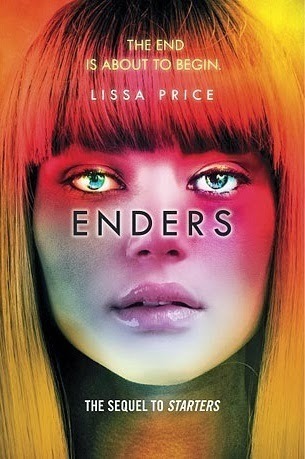 You may recall that I really enjoyed Lissa Price's debut
Starters
. It's a fast-paced, well-plotted, and exciting futuristic story that takes a lot of liberties with science, but is fun nonetheless. I looked forward to reading its sequel (it's a duology, so this book is the final in the series),
Enders
, for quite some time.
You may recall that I really enjoyed Lissa Price's debut
Starters
. It's a fast-paced, well-plotted, and exciting futuristic story that takes a lot of liberties with science, but is fun nonetheless. I looked forward to reading its sequel (it's a duology, so this book is the final in the series),
Enders
, for quite some time.Alas, Enders is a mess. While it thankfully addresses the fact that all people over 60 in this world where people live to be 200+ are not, in fact, called enders (some of them are called middles), that's about the only satisfying aspect I found.
The plot involves Callie trying to rescue a number of other teens who were at the body bank and have chips implanted in their heads. The Old Man has found a way to control these teens (called Metals) via the chips - he can actually speak to Callie in her mind by using her chip as well as control her body movements at times. Callie isn't sure what the Old Man's end game is, but she's found an ally in his son, Hyden (no, not Hayden. Hyden, and yes, he does seem to just appear out of nowhere), plus her friend Michael.
The main issue is that Enders just doesn't seem to know what exactly it should be doing. Where Starters was tightly-plotted, Enders just meanders. Action isn't driven by character or plot. The characters themselves seem to just sort of wander around too, until they finally all come together in a skeezy climax that is only mildly interesting. It also involves two major pieces of wish-fulfillment that are difficult to believe.
Readers of Starters will recall that the Old Man was a creepy, deliciously villainous bad guy. Without spoiling anything, I can say that the way his character is developed in Enders feels like a giant cheat - like Price was trying to have her cake and eat it too. As a result, there is a huge disconnect between his character in the first book and his character in the second book. They may as well be different people. It feels a bit like a retcon of the first book, actually.
Furthermore, I was never quite sure what Callie and her group of Metals intended to do once they all got together, and I don't think Callie knew either. Motivations are so murky, the character of Hyden is so forced (and contradictory), and other ancillary characters are so underdeveloped as to be forgotten. (What was Michael doing the duration of the story? I couldn't even recall most of the time whether he was with Callie or away babysitting Tyler.) The difference between Starters and Enders is like night and day.
Diehard fans of the first book will want to pick this up, but otherwise, you can give it a miss.
(I don't often disagree this strongly with major review publications. I suppose you may like to know that both Booklist and Kirkus gave this book fairly positive reviews. This mainly just makes me think "Huh." To each their own.)
Review copy provided by the publisher. Enders is available now.







 Related StoriesCruel Beauty by Rosamund HodgeBright Before Sunrise by Tiffany SchmidtTin Star by Cecil Castellucci
Related StoriesCruel Beauty by Rosamund HodgeBright Before Sunrise by Tiffany SchmidtTin Star by Cecil Castellucci
Published on February 25, 2014 22:00
February 24, 2014
YA Adaptations of Adult Novels
I'm not a huge YA non-fiction reader, despite really enjoying adult non-fiction. I'm not sure why that is, but after this last year on committee reading and talking about non-fiction, I've been thinking a lot more about YA non-fiction. During one of our meetings, I brought up the topic of YA adaptations of adult non-fiction titles, and a number of people didn't know that it was a thing that happened. In light of that, I thought it would be worthwhile to put together a list of non-fiction titles that began as adult books but then were rewritten and adapted for YA audiences.
Not every adult non-fiction title gets a YA adaptation, and in fact, I don't think it's a particularly big phenomenon. The books that seem to be adapted tend to be ones with high YA interest, gauged either through them being read or assigned in school, through them featuring primarily teen or younger main characters, or they're books teens have been picking up and talking about all their own. Part of me wonders if sometimes adaptations happen when the title isn't working for adults and there's a decision to repackage and remarket for younger readers instead. Sometimes, the books that adapted for younger readers are surprising choices and other times, they're natural fits. The sports adaptations to me are pretty obvious choices, especially for popular athletes, and the historical or cultural adaptations seem natural, too.
It's interesting, too, to think about the adult non-fiction teens love that was never reworked as a YA non-fiction (say, for example, Dave Pelzner books, Alexandra Robbins books, or titles like Ophelia Speaks or Queen Bees and Wanna Bes, which have good appeal and readership to teens) against those which have.
YA adaptations of adult non-fiction are interesting. Sometimes, they present the material in a way that's stronger and more engaging than the adult version of the novels. Other times, they're weaker because of how the adaptation was presented -- too much information was cut or the writing itself is taken to a level that doesn't engage the reader. It is entirely dependent upon the writer and his or her ability to write for the YA audience or work with someone who is comfortable in doing so themselves, as not all adaptations are written by the original author.
One example standing out to me is I Am Malala by Malala Yousafzai. The book came out at the end of last year, written by Malala and Christina Lamb. Malala's voice really comes through in the book, but it's also clear she's not a writer herself. The story told was important, but the book never fully engaged me because it wasn't consistent nor fluid in execution. The narrative thread was weak, and that's one of the most important elements of non-fiction: it was much more of a straight sharing of events that happened, rather than a working through of events that happened tied either to a bigger point or event (think about the best memoirs you've read -- they aren't timelines of events but a story around a grander theme or idea).
Coming this summer is a YA adaptation of the story. It's written by Malala, but in the young reader edition, Patricia McCormick will be co-authoring. Knowing McCormick has written fiction tackling many of the things that have been a part of Malala's life in her country, it seems not only a natural choice but suggests that perhaps the adaptation will be a stronger, more compelling read (at least to me!). Thinking about McCormick's Sold especially, I suspect she'll be a really smart and solid writer able to help Malala's writing come across stronger, but it'll make her voice ring even louder.
Here's a look at a pile of other YA adaptations of adult non-fiction books. All descriptions are from WorldCat. As always, this is not comprehensive, so if there are other titles I should know about, I'd love to hear in the comments so they can be added.

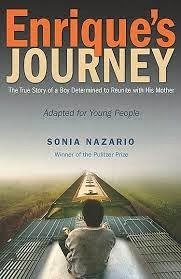
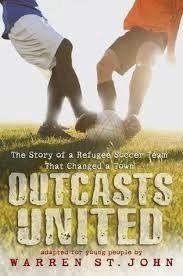
Chew On This by Eric Schlosser and Charles Wilson: A behind-the-scenes look at the fast food industry. Adapted from Fast Food Nation .
Enrique's Journey by Sonia Nazario: When Enrique was five, his mother, too poor to feed her children, left Honduras to work in the United States. The move allowed her to send money back home so Enrique could eat better and go to school past the third grade. She promised she would return quickly, but she struggled in America. Without her, he became lonely and troubled. After eleven years, he decided he would go find her. He set off alone, with little more than a slip of paper bearing his mother's North Carolina telephone number. Without money, he made the dangerous trek up the length of Mexico, clinging to the sides and tops of freight trains. He and other migrants, many of them children, are hunted like animals. To evade bandits and authorities, they must jump onto and off the moving boxcars they call the Train of Death. It is an epic journey, one thousands of children make each year to find their mothers in the United States. Adapted from Enrique's Journey .
Outcasts United by Warren St. John: American-educated Jordanian Luma Mufleh founds a youth soccer team comprised of children from Liberia, Iraq, Afghanistan, and the Balkan states, and elsewhere in the refugee settlement town of Clarkston, Georgia, bringing the children together to discover their common bonds as they adjust to life in a new homeland. Adapted from Outcasts United .
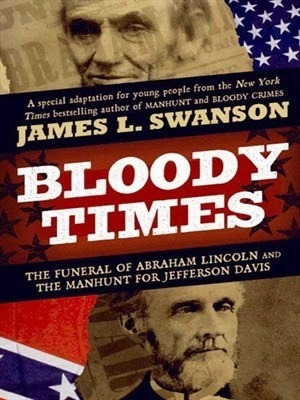

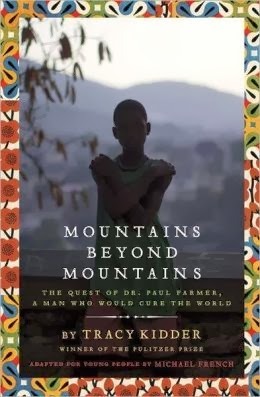
Bloody Times by James Swanson: On the morning of April 2, 1865, Jefferson Davis received a telegram from General Robert E. Lee. There is no more time--the Yankees are coming, it warned. That night Davis fled Richmond, setting off an intense manhunt for the Confederate president. Two weeks later, President Lincoln was assassinated, and the nation was convinced that Davis was involved in the conspiracy that led to the crime. Lincoln's murder, autopsy, and White House funeral transfixed the nation. His final journey began when soldiers placed his corpse aboard a special train that would carry him home to Springfield, Illinois. It was the most magnificent funeral pageant in American history. Adapted from Bloody Crimes .
Chasing Lincoln's Killer by James Swanson: Recounts the escape of John Wilkes Booth, Abraham Lincoln's assassin, and follows the intensive twelve-day search for him and his accomplices. Adapted from Manhunt: The 12-Day Chase for Lincoln's Killer .
Mountains Beyond Mountains by Tracy Kidder: Traces the efforts of Dr. Paul Farmer to transform healthcare on a global scale, documenting his visits to some of the world's most impoverished regions and the unconventional methods that enabled him to improve and save lives. Adapted from Mountains Beyond Mountains .
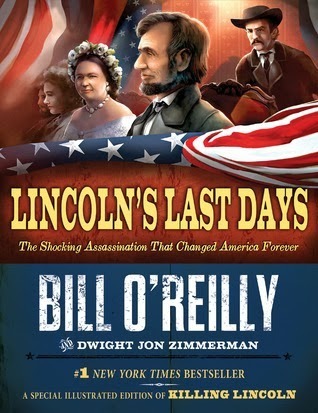
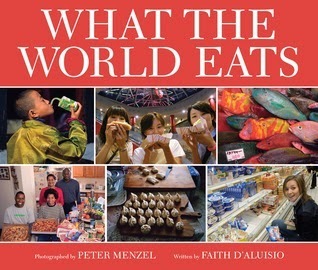
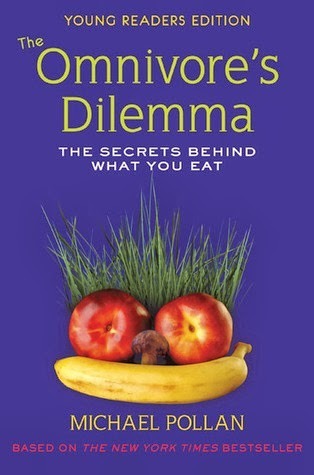
Lincoln's Last Days by Bill O'Reilly with Dwight John Zimmerman: Describes the events surrounding the assassination of Abraham Lincoln and the hunt to track down John Wilkes Booth and his accomplices. Adapted from Killing Lincoln .
What the World Eats by Peter Menzel and Faith D'Aluisio: A photographic collection exploring what the world eats featuring portraits of twenty-five families from twenty-one countries surrounded by a week's worth of food. Adapted from Hungry Planet .
The Omnivore's Dilemma by Michael Pollan: What's for dinner?' seemed like a simple question -until journalist and supermarket detective Michael Pollan delved behind the scenes. From fast food and big organic to small farms and old-fashioned hunting and gathering, this young readers' adaptation of Pollan's famous food-chain exploration encourages kids to consider the personal and global health implications of their food choices. Adapted from The Omnivore's Dilemma .
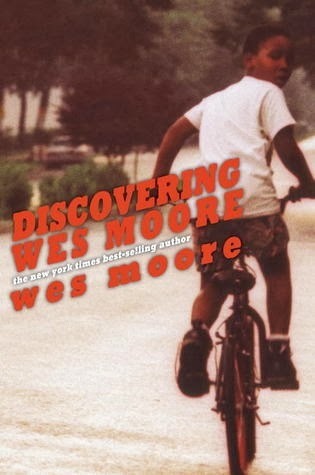
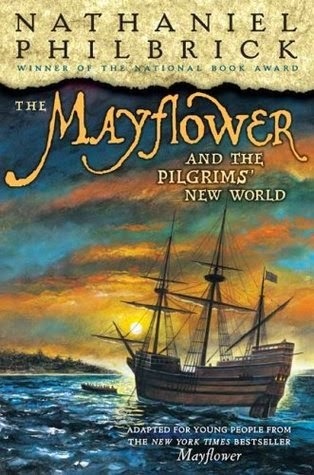
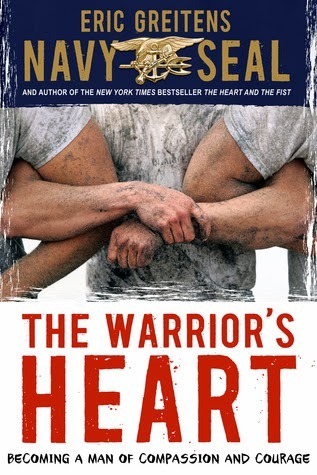
Discovering Wes Moore by Wes Moore: The author, a Rhodes scholar and combat veteran, analyzes factors that influenced him as well as another man of the same name and from the same neighborhood who was drawn into a life of drugs and crime and ended up serving life in prison, focusing on the influence of relatives, mentors, and social expectations that could have led either of them on different paths. Adapted from The Other Wes Moore: Two Names, One Fate .
The Mayflower and the Pilgrims' New World by Nathaniel Philbrick: After a journey across the Atlantic, the Mayflower's passengers were saved from destruction with the help of the natives of the Plymouth region. For fifty years, peace was maintained as Pilgrims and Natives worked together. But that trust was broken with the next generation of leaders, and conflict erupted that nearly wiped out English and natives alike. Adapted from Mayflower: A Story of Courage, Community, and War .
The Warrior's Heart by Eric Greitens: Shares the author's adventures as a young man that led him to a life of service as both a humanitarian and a Navy SEAL. Adapted from The Heart and the Fist .
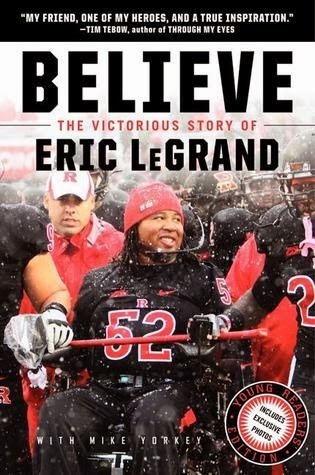
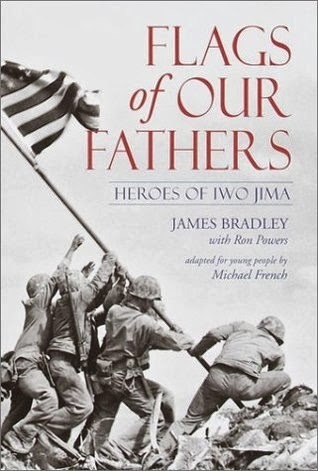
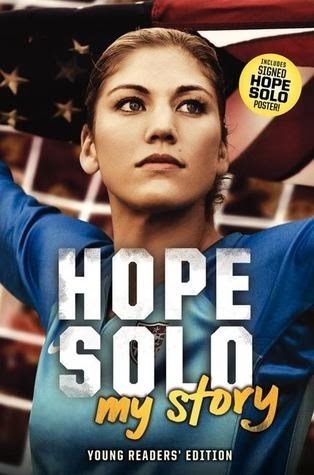
Believe by Eric LeGrand: In this uplifting memoir, now adapted for young readers, Eric LeGrand tells the amazing story of how he rebuilds his life, continues his college education, and pursues a career in sports broadcasting following the injury that paralyzed him from the neck down. His belief in a grand plan and his hope for the future make him a model for anyone who has experienced tragedy or faced obstacles. Adapted from Believe: My Faith and the Tackle That Changed My Life .
Flags of Our Fathers by James Bradley with Ron Powers and Michael French: A true story behind the immortal photograph that has come to symbolize the courage and indomitable will of America. Adapted from Flags of Our Fathers .
Hope Solo: My Story by Hope Solo: Hope Solo, Olympic gold medalist and goalie for the US women's national soccer team, tells the exciting insider details of her life on and off the field, in her own words. Adapted from Solo: A Memoir of Hope .







 Related StoriesTeen Dating Violence Awareness Month: A Discussion and Reading GuideFebruary Debut YA NovelsFootball Culture: Reviews and Thoughts from Outstanding Books for the College Bound
Related StoriesTeen Dating Violence Awareness Month: A Discussion and Reading GuideFebruary Debut YA NovelsFootball Culture: Reviews and Thoughts from Outstanding Books for the College Bound
Not every adult non-fiction title gets a YA adaptation, and in fact, I don't think it's a particularly big phenomenon. The books that seem to be adapted tend to be ones with high YA interest, gauged either through them being read or assigned in school, through them featuring primarily teen or younger main characters, or they're books teens have been picking up and talking about all their own. Part of me wonders if sometimes adaptations happen when the title isn't working for adults and there's a decision to repackage and remarket for younger readers instead. Sometimes, the books that adapted for younger readers are surprising choices and other times, they're natural fits. The sports adaptations to me are pretty obvious choices, especially for popular athletes, and the historical or cultural adaptations seem natural, too.
It's interesting, too, to think about the adult non-fiction teens love that was never reworked as a YA non-fiction (say, for example, Dave Pelzner books, Alexandra Robbins books, or titles like Ophelia Speaks or Queen Bees and Wanna Bes, which have good appeal and readership to teens) against those which have.
YA adaptations of adult non-fiction are interesting. Sometimes, they present the material in a way that's stronger and more engaging than the adult version of the novels. Other times, they're weaker because of how the adaptation was presented -- too much information was cut or the writing itself is taken to a level that doesn't engage the reader. It is entirely dependent upon the writer and his or her ability to write for the YA audience or work with someone who is comfortable in doing so themselves, as not all adaptations are written by the original author.
One example standing out to me is I Am Malala by Malala Yousafzai. The book came out at the end of last year, written by Malala and Christina Lamb. Malala's voice really comes through in the book, but it's also clear she's not a writer herself. The story told was important, but the book never fully engaged me because it wasn't consistent nor fluid in execution. The narrative thread was weak, and that's one of the most important elements of non-fiction: it was much more of a straight sharing of events that happened, rather than a working through of events that happened tied either to a bigger point or event (think about the best memoirs you've read -- they aren't timelines of events but a story around a grander theme or idea).
Coming this summer is a YA adaptation of the story. It's written by Malala, but in the young reader edition, Patricia McCormick will be co-authoring. Knowing McCormick has written fiction tackling many of the things that have been a part of Malala's life in her country, it seems not only a natural choice but suggests that perhaps the adaptation will be a stronger, more compelling read (at least to me!). Thinking about McCormick's Sold especially, I suspect she'll be a really smart and solid writer able to help Malala's writing come across stronger, but it'll make her voice ring even louder.
Here's a look at a pile of other YA adaptations of adult non-fiction books. All descriptions are from WorldCat. As always, this is not comprehensive, so if there are other titles I should know about, I'd love to hear in the comments so they can be added.



Chew On This by Eric Schlosser and Charles Wilson: A behind-the-scenes look at the fast food industry. Adapted from Fast Food Nation .
Enrique's Journey by Sonia Nazario: When Enrique was five, his mother, too poor to feed her children, left Honduras to work in the United States. The move allowed her to send money back home so Enrique could eat better and go to school past the third grade. She promised she would return quickly, but she struggled in America. Without her, he became lonely and troubled. After eleven years, he decided he would go find her. He set off alone, with little more than a slip of paper bearing his mother's North Carolina telephone number. Without money, he made the dangerous trek up the length of Mexico, clinging to the sides and tops of freight trains. He and other migrants, many of them children, are hunted like animals. To evade bandits and authorities, they must jump onto and off the moving boxcars they call the Train of Death. It is an epic journey, one thousands of children make each year to find their mothers in the United States. Adapted from Enrique's Journey .
Outcasts United by Warren St. John: American-educated Jordanian Luma Mufleh founds a youth soccer team comprised of children from Liberia, Iraq, Afghanistan, and the Balkan states, and elsewhere in the refugee settlement town of Clarkston, Georgia, bringing the children together to discover their common bonds as they adjust to life in a new homeland. Adapted from Outcasts United .



Bloody Times by James Swanson: On the morning of April 2, 1865, Jefferson Davis received a telegram from General Robert E. Lee. There is no more time--the Yankees are coming, it warned. That night Davis fled Richmond, setting off an intense manhunt for the Confederate president. Two weeks later, President Lincoln was assassinated, and the nation was convinced that Davis was involved in the conspiracy that led to the crime. Lincoln's murder, autopsy, and White House funeral transfixed the nation. His final journey began when soldiers placed his corpse aboard a special train that would carry him home to Springfield, Illinois. It was the most magnificent funeral pageant in American history. Adapted from Bloody Crimes .
Chasing Lincoln's Killer by James Swanson: Recounts the escape of John Wilkes Booth, Abraham Lincoln's assassin, and follows the intensive twelve-day search for him and his accomplices. Adapted from Manhunt: The 12-Day Chase for Lincoln's Killer .
Mountains Beyond Mountains by Tracy Kidder: Traces the efforts of Dr. Paul Farmer to transform healthcare on a global scale, documenting his visits to some of the world's most impoverished regions and the unconventional methods that enabled him to improve and save lives. Adapted from Mountains Beyond Mountains .



Lincoln's Last Days by Bill O'Reilly with Dwight John Zimmerman: Describes the events surrounding the assassination of Abraham Lincoln and the hunt to track down John Wilkes Booth and his accomplices. Adapted from Killing Lincoln .
What the World Eats by Peter Menzel and Faith D'Aluisio: A photographic collection exploring what the world eats featuring portraits of twenty-five families from twenty-one countries surrounded by a week's worth of food. Adapted from Hungry Planet .
The Omnivore's Dilemma by Michael Pollan: What's for dinner?' seemed like a simple question -until journalist and supermarket detective Michael Pollan delved behind the scenes. From fast food and big organic to small farms and old-fashioned hunting and gathering, this young readers' adaptation of Pollan's famous food-chain exploration encourages kids to consider the personal and global health implications of their food choices. Adapted from The Omnivore's Dilemma .



Discovering Wes Moore by Wes Moore: The author, a Rhodes scholar and combat veteran, analyzes factors that influenced him as well as another man of the same name and from the same neighborhood who was drawn into a life of drugs and crime and ended up serving life in prison, focusing on the influence of relatives, mentors, and social expectations that could have led either of them on different paths. Adapted from The Other Wes Moore: Two Names, One Fate .
The Mayflower and the Pilgrims' New World by Nathaniel Philbrick: After a journey across the Atlantic, the Mayflower's passengers were saved from destruction with the help of the natives of the Plymouth region. For fifty years, peace was maintained as Pilgrims and Natives worked together. But that trust was broken with the next generation of leaders, and conflict erupted that nearly wiped out English and natives alike. Adapted from Mayflower: A Story of Courage, Community, and War .
The Warrior's Heart by Eric Greitens: Shares the author's adventures as a young man that led him to a life of service as both a humanitarian and a Navy SEAL. Adapted from The Heart and the Fist .



Believe by Eric LeGrand: In this uplifting memoir, now adapted for young readers, Eric LeGrand tells the amazing story of how he rebuilds his life, continues his college education, and pursues a career in sports broadcasting following the injury that paralyzed him from the neck down. His belief in a grand plan and his hope for the future make him a model for anyone who has experienced tragedy or faced obstacles. Adapted from Believe: My Faith and the Tackle That Changed My Life .
Flags of Our Fathers by James Bradley with Ron Powers and Michael French: A true story behind the immortal photograph that has come to symbolize the courage and indomitable will of America. Adapted from Flags of Our Fathers .
Hope Solo: My Story by Hope Solo: Hope Solo, Olympic gold medalist and goalie for the US women's national soccer team, tells the exciting insider details of her life on and off the field, in her own words. Adapted from Solo: A Memoir of Hope .







 Related StoriesTeen Dating Violence Awareness Month: A Discussion and Reading GuideFebruary Debut YA NovelsFootball Culture: Reviews and Thoughts from Outstanding Books for the College Bound
Related StoriesTeen Dating Violence Awareness Month: A Discussion and Reading GuideFebruary Debut YA NovelsFootball Culture: Reviews and Thoughts from Outstanding Books for the College Bound
Published on February 24, 2014 22:00
My Exciting News, Part 2: The V-Word
I mentioned in a post earlier this month that two really great things happened to me immediately following ALA Midwinter. The first I covered in that post. The second one I didn't get to talk about yet, but I got the message about it quite literally as I was sitting in the gate area, getting ready to fly home from Philadelphia.
Now I can share it.
First, a little back story. Perhaps this is personal, but maybe it's not. I suspect a lot of readers will have this kind of story or know this kind of story or have thought about it. So here goes.
I didn't get one of those sex talks growing up. There was never a time I was sat down and talked to frankly about sex. Sure, I sat through this terrible school sex talks -- one which included a paper heart that yes, was torn into pieces to show girls what happened to their purity each time they had sex -- but it was never more than that.
My information about sex and my body instead came from three places: my friends, the internet, and books.
I remember distinctly learning about oral sex in 3rd grade, when my best friend at the time told me what one of the lines in an Alanis Morissette meant (I'm sure you know the line).
I remember the day I discovered Scarleteen, the forums and Q&As that spoke directly to me and answered questions I had, as well as questions I didn't know that I had.
I remember picking up books like Judy Blume's Forever and Deenie and Are You There God? It's Me Margaret and having those messages about sex and sexuality given to me when I did and didn't know I was looking for them. Not to mention the countless articles I read in Seventeen and other teen magazines (I was too young for the hey day of Sassy, but I was that kid who dutifully checked the back issues all out from the library when I was 12 and 13).
I remember the things I really learned when I went to high school and then even more so when I went to a very liberal liberal arts college. Where I kept a jar of condoms in my room. Where I heard about other people's first and second and eighth experiences and where I had my first.
There were things I wish I'd known before then. Things I wish I'd read or seen or thought about.
And today, there are teen girls who have not just with those same thoughts and worries and questions and interests and curiosities, but they're riddled with even tougher work to get real, honest information about those things. It's not that the information isn't out there. It's that there's so much out there now, that figuring out what it is you need to know can be tough because it's not always easy to discern, say, porn truth from real truth or agenda or fear based truth. The waters are a lot murkier, cloudier, and tougher to navigate.
So when Amber Keyser approached me about a project she had in mind, I was all in because not only was this the kind of thing I wish I'd had when I was a teenager, but because it is the kind of thing I wish I could hand every single teen girl who needs it now.
From Publisher's Marketplace's announcement:

Beyond Words is an imprint of Simon & Schuster, for those of you not familiar with it. I encourage you to read more about the book on Amber's website, as well.
As you may remember, I wrote a lengthy post about female sexuality and about positive portrayals thereof last June. It was from that Amber reached out to me, and we talked about including a portion within her anthology about books (and perhaps films) that portray female sexuality in positive, empowering ways.
My portion of this book will be a Question & Answer section, delving into the various issues surrounding sex, first times, and what there is available that portrays these things in positive, worthwhile ways. In other words, where are the books girls can turn to to read healthy experiences regarding masturbation or losing her virginity?
Because we know information girls receive about sex comes from those around them, as well as the media they take in, this is geared toward being a guide to better understanding the language, the labels, and the experiences girls see and feel and have and live when it comes to their sexual lives.
This will be an edgy, no-holds-barred approach that is meant to empower girls with decision making tools and hopefully (!!!) allow them to better understand themselves and where it is they stand on making decisions about their sexual lives.
I'm thinking of this as a putting my money where my mouth is -- we can shout from the rooftops that we want to empower girls and we want to educate them, but until we talk about these issues with them, rather than talk about these issues with each other as adults, we don't know whether the message is being heard.
This is about the message being heard, as well as giving girls the tools to find and think about those very messages.
While we've fleshed out much of what it is we want to ensure we hit in this Q&A, since this is a work in development and knowing that many of our readers here at Stacked are teachers, librarians, writers, and/or former teen girls themselves (if not teen girls now!), I also wanted to open up an opportunity for anyone to weigh in. What are the things you wish you'd known about sex and virginity growing up? What are some of the things you wish today's teens knew or had the tools to think about? The angle of this book is positive -- meaning that choice (which of course means choice to be sexually active and choice not to be sexually active) is a key player in any and all decisions here -- but we will touch on the negative sides of sex and sexuality, as well.
I've opened up a form for anyone to drop in their thoughts and ideas (if you wish to be anonymous or elaborate), and the comments are open for suggestions as well. Have you read YA books with awesome, sexually empowering messages or themes? Great articles on this topic worth thinking about? What about less than excellent depictions? I'd love any thoughts or ideas or leads you may have.
Loading...
I'm so excited about this opportunity (and this might not be the last announcement I make about this) and I'm even more excited that this book will exist for teen girls who will benefit tremendously. While Spring 2016 may seem like it's forever away, my deadline is . . . not that far away. It's going to fly by.
There is nothing else out there like The V-Word geared towards teen girls in a positive, empowering manner.








Now I can share it.
First, a little back story. Perhaps this is personal, but maybe it's not. I suspect a lot of readers will have this kind of story or know this kind of story or have thought about it. So here goes.
I didn't get one of those sex talks growing up. There was never a time I was sat down and talked to frankly about sex. Sure, I sat through this terrible school sex talks -- one which included a paper heart that yes, was torn into pieces to show girls what happened to their purity each time they had sex -- but it was never more than that.
My information about sex and my body instead came from three places: my friends, the internet, and books.
I remember distinctly learning about oral sex in 3rd grade, when my best friend at the time told me what one of the lines in an Alanis Morissette meant (I'm sure you know the line).
I remember the day I discovered Scarleteen, the forums and Q&As that spoke directly to me and answered questions I had, as well as questions I didn't know that I had.
I remember picking up books like Judy Blume's Forever and Deenie and Are You There God? It's Me Margaret and having those messages about sex and sexuality given to me when I did and didn't know I was looking for them. Not to mention the countless articles I read in Seventeen and other teen magazines (I was too young for the hey day of Sassy, but I was that kid who dutifully checked the back issues all out from the library when I was 12 and 13).
I remember the things I really learned when I went to high school and then even more so when I went to a very liberal liberal arts college. Where I kept a jar of condoms in my room. Where I heard about other people's first and second and eighth experiences and where I had my first.
There were things I wish I'd known before then. Things I wish I'd read or seen or thought about.
And today, there are teen girls who have not just with those same thoughts and worries and questions and interests and curiosities, but they're riddled with even tougher work to get real, honest information about those things. It's not that the information isn't out there. It's that there's so much out there now, that figuring out what it is you need to know can be tough because it's not always easy to discern, say, porn truth from real truth or agenda or fear based truth. The waters are a lot murkier, cloudier, and tougher to navigate.
So when Amber Keyser approached me about a project she had in mind, I was all in because not only was this the kind of thing I wish I'd had when I was a teenager, but because it is the kind of thing I wish I could hand every single teen girl who needs it now.
From Publisher's Marketplace's announcement:

Beyond Words is an imprint of Simon & Schuster, for those of you not familiar with it. I encourage you to read more about the book on Amber's website, as well.
As you may remember, I wrote a lengthy post about female sexuality and about positive portrayals thereof last June. It was from that Amber reached out to me, and we talked about including a portion within her anthology about books (and perhaps films) that portray female sexuality in positive, empowering ways.
My portion of this book will be a Question & Answer section, delving into the various issues surrounding sex, first times, and what there is available that portrays these things in positive, worthwhile ways. In other words, where are the books girls can turn to to read healthy experiences regarding masturbation or losing her virginity?
Because we know information girls receive about sex comes from those around them, as well as the media they take in, this is geared toward being a guide to better understanding the language, the labels, and the experiences girls see and feel and have and live when it comes to their sexual lives.
This will be an edgy, no-holds-barred approach that is meant to empower girls with decision making tools and hopefully (!!!) allow them to better understand themselves and where it is they stand on making decisions about their sexual lives.
I'm thinking of this as a putting my money where my mouth is -- we can shout from the rooftops that we want to empower girls and we want to educate them, but until we talk about these issues with them, rather than talk about these issues with each other as adults, we don't know whether the message is being heard.
This is about the message being heard, as well as giving girls the tools to find and think about those very messages.
While we've fleshed out much of what it is we want to ensure we hit in this Q&A, since this is a work in development and knowing that many of our readers here at Stacked are teachers, librarians, writers, and/or former teen girls themselves (if not teen girls now!), I also wanted to open up an opportunity for anyone to weigh in. What are the things you wish you'd known about sex and virginity growing up? What are some of the things you wish today's teens knew or had the tools to think about? The angle of this book is positive -- meaning that choice (which of course means choice to be sexually active and choice not to be sexually active) is a key player in any and all decisions here -- but we will touch on the negative sides of sex and sexuality, as well.
I've opened up a form for anyone to drop in their thoughts and ideas (if you wish to be anonymous or elaborate), and the comments are open for suggestions as well. Have you read YA books with awesome, sexually empowering messages or themes? Great articles on this topic worth thinking about? What about less than excellent depictions? I'd love any thoughts or ideas or leads you may have.
Loading...
I'm so excited about this opportunity (and this might not be the last announcement I make about this) and I'm even more excited that this book will exist for teen girls who will benefit tremendously. While Spring 2016 may seem like it's forever away, my deadline is . . . not that far away. It's going to fly by.
There is nothing else out there like The V-Word geared towards teen girls in a positive, empowering manner.








Published on February 24, 2014 11:53
February 23, 2014
February Debut YA Novels

February may be the shortest month of the year, but there is a nice selection of debut YA novels coming out this month. I find pulling these lists together each month is helpful for me not only as a reader, but also for me as a librarian to get some new voices and titles on my radar. You can see January's debuts here, with a nice series of additional titles to the list in the comments.
All of the books in this roundup are debuts in the truest sense of the word -- these are the first books published by the author in any category. Descriptions come from WorldCat unless otherwise noted, and please feel free to let me know if I've missed any for this month in the comments.
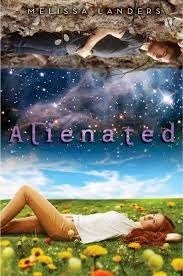
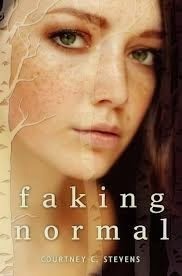
Alienated by Melissa Landers: High school senior Cara Sweeney gets more than she bargained for when she agrees to participate in earth's first intergalactic high school exchange program.
Faking Normal by Courtney C. Stevens: Alexi Littrell hasn't told anyone what happened to her over the summer. When Bodee Lennox, the quiet and awkward boy next door, comes to live with the Littrells, Alexi discovers an unlikely friend in "the Kool-Aid Kid," who has secrets of his own. As they lean on each other for support, Alexi gives him the strength to deal with his past, and Bodee helps her find the courage to finally face the truth. Reviewed here.
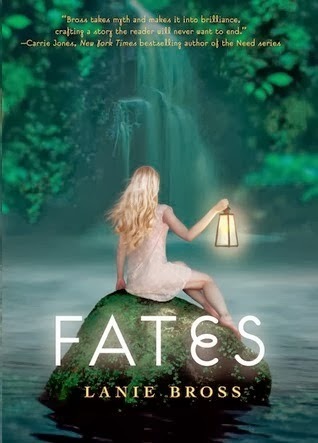

Fates by Lanie Bross: Corinthe, a former Fate and now Executor, responsible for carrying out unfulfilled destinies on Earth, finds herself falling for Lucas, a human boy whose death she is supposed to enact as her last act before returning to Pyralis.
Landry Park by Bethany Hagen: In a futuristic, fractured United States where the oppressed Rootless handle the raw nuclear material that powers the Gentry's lavish lifestyle, seventeen-year-old Madeline Landry must choose between taking over her father's vast estate or rebelling against everything she has ever known, in the name of justice.
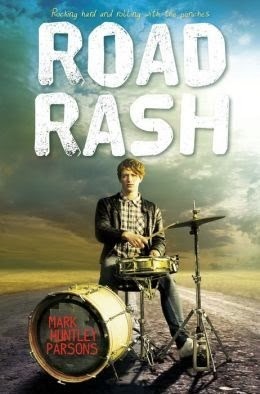
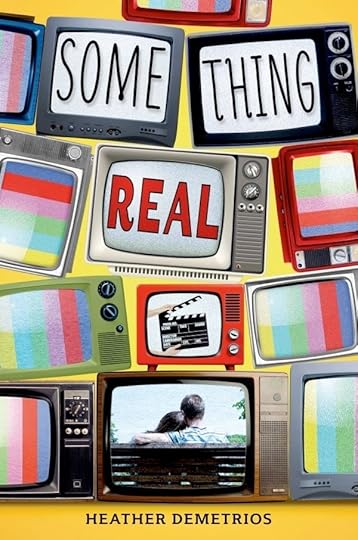
Road Rash by Mark Huntley Parsons: When teen drummer, Zach, signed up to spend the summer on tour with a rock band, he didn't realize the stairway to heaven was such a bumpy ride.
Something Real by Heather Demetrios: Since the cancellation of her family's reality television show, seventeen-year-old Bonnie Baker, one of twelve siblings, has tried to live a normal life with real friends and a possible boyfriend, until her mother and the show's producers decide to bring "Baker's Dozen" back on the air. Other reality television inspired YA novels.
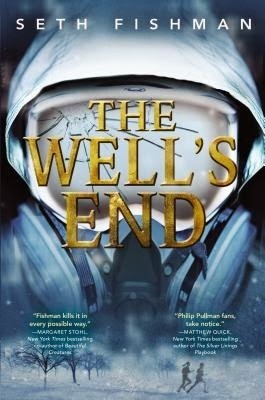
The Well's End by Seth Fishman: 16-year-old Mia Kish and her friends search for answers when a mysterious illness brings their Colorado community to its knees.







 Related StoriesCruel Beauty by Rosamund HodgeBright Before Sunrise by Tiffany SchmidtSeries Conclusions
Related StoriesCruel Beauty by Rosamund HodgeBright Before Sunrise by Tiffany SchmidtSeries Conclusions
Published on February 23, 2014 22:00
February 21, 2014
Links of Note: February 22, 2014

Being better at taking pictures of my displays at work also means more pictures of my displays at work becoming images to lead off link roundups. This is how I decided to put together a black history month display; the sign in the back says to read books by and featuring black people/characters not just this month, but every month. I've been thrilled with seeing these books go out.
On to this week's links. If I've missed something big or interesting, I'd love to know!
The Cybils awards were announced on Valentine's Day, last Friday. Check out this year's winners in every category, including speculative YA fiction, where Kimberly served as a judge. Have you heard of the Tiptree awards? This annual award and list of honors is given to science fiction and fantasy novels that "expand or explore our understandings of gender." This year's list is pretty awesome, so check it out. I can't say I didn't see this coming, though it still makes me sad and makes me wonder whether it's time to consider an alternative eReader, but it looks like Barnes & Noble is discontinuing its Nook Touch. What happens if B&N gets out of the eReader business all together? Do all of those ebook purchases also just disappear when your device kicks it? This discussion in the New York Times about whether or not we need "negative" book reviews is really interesting. I'm firmly on the side that yes, we do. Not just because it saves the time of readers, but many times, I will pick up a book because of a negative review (either there's something I want to see for myself or I tend to disagree with the reviewer and their negative review suggests it might be the exact right book for me).There is a really nice piece in the Boston Globe about Candlewick Press. I've loved so many of the books Candlewick has published, and this gave even more insight into how they choose their titles and how they have grown as a business. For the librarians: collection development in four easy steps. I love Laurel Snyder's post over at Medium about boys and girls and reading and gender. Boys will be boys and girls will be accommodating. How cool is Waterstone's recreation of famous literary scenes in LEGOs? Very cool. On the CBC Diversity tumblr, Aaron Hartzler wrote a really great post about religion in YA. More than worth the read and consideration in light of diversity. Speaking of diversity, Cheryl Klein's post about diversity and the challenges and complexities of publishing diverse titles is more than worth the read. Then go read Beth Revis's post about diversity and why it matters, especially in the YA world. What's the current state of reader's advisory? This is an interesting and enlightening read all around, but the part that stood out to me most was this: "Many librarians perceive that changes in the makeup of library staff are harming RA service. Many librarians now are not readers, their colleagues say, or at least don’t read widely enough to become expert readers’ advisors." You are all reading Molly Wetta's blog, right? If you don't, you should be. One reason is that she does a spectacular job of book roundups of new and forthcoming titles. Case in point: here's a roundup of 2014 LGBTQ fiction. One of my favorite non-book related blogs to read on the daily is Design Sponge. There's a little bit of everything here, and I'm usually surprised by the fun things that pop up. For example, this interview with one of the Google Doodle designers is worth the read. I've read a ton of blog posts highlighting YA books that tie into the winter Olympic sports, but I think the one over at Crunchings and Munchings is the most comprehensive. Check it out. Here are this year's SYNC audiobooks, which will be available for free each week during the summer. This program connects teens and audiobooks, though obviously anyone can download them. They've offered this program for a few years and their choices are a great mix of new titles and classics. There is no such thing as a "real reader." This post is perfect.
Malinda Lo broke down the diversity on this year's Best Fiction for Young Adults list and compared it to years past. This is fascinating stuff.
My posts elsewhere:
I was resistant to Tumblr for a really long time, but it turns out I am really liking it for pulling together quicker thoughts between blog posts. Last week, I talked a bit about The New York Times's YA Bestsellers list and how there is only one female on it. It took off a little more than I expected and it's driving home the point I need to look at the series list, as well as other lists. At Book Riot, I rounded up a ton of the "best" of lists that tackle everything from adult genre fiction to picture books into one post, with descriptions of each list and links right to them. Enjoy. Do you like fancy drinks while you read? My husband and I concocted 14 drinks to pair with 7 YA romance novels -- 7 of them with booze and 7 of them without. It's possible we have been working our way through those ourselves (the drinks and the books). Apparently I've done a lot of writing at Book Riot in the last two weeks. Here's my monthly installment of "Beyond the Bestsellers," this month on what to read after you've read Marissa Meyer's "Lunar Chronicles" series. Retellings ahoy! Adele, from Persnickety Snark, is back to blogging after a three year hiatus. One of the things she wanted to do was talk with different bloggers about how the blogging world has changed in that time, and she was kind enough to talk with me. So if you're curious about the blogging world, how it's changed and grown, how Kimberly and I have changed and grown, and you want some recs for great blogs to read, here you go! This is a series, and I'm eager to see what other bloggers will have to say about this.







 Related StoriesLinks of Note: February 8, 2014Links of Note: January 25, 2014Links of Note: January 11, 2014
Related StoriesLinks of Note: February 8, 2014Links of Note: January 25, 2014Links of Note: January 11, 2014
Published on February 21, 2014 22:00
February 20, 2014
The Shadow Throne by Jennifer A. Nielsen
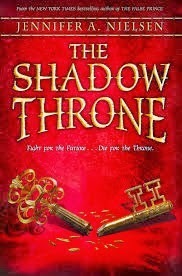 The Shadow Throne
, the third and final book in the False Prince trilogy, starts off with a bang: Carthya is officially at war. Its neighbors - led by King Vargan of Avenia - are sending armies to attack, and it looks like its allies are few and far between. Jaron must become a war strategist, using a combination of trickery, fast talking, and military prowess to fight back.
The Shadow Throne
, the third and final book in the False Prince trilogy, starts off with a bang: Carthya is officially at war. Its neighbors - led by King Vargan of Avenia - are sending armies to attack, and it looks like its allies are few and far between. Jaron must become a war strategist, using a combination of trickery, fast talking, and military prowess to fight back. And then the situation gets even worse: Imogen is kidnapped. By Vargan and the Avenians. Jaron knows they plan to leverage her against him in some way, but he can't bear to leave her to the Avenians and whatever tortures they devise. He mounts a rescue. He falls into a trap. All within the first few pages. This is an exciting, action-packed book, and much like in the first two installments, Jaron isn't completely forthright with the reader about his plans - which just makes everything all the more fun when those plans are fully revealed.
While I enjoyed this volume, it has some of the same problems present in the second book. Specifically, there's a couple of loyalty shifts near the end, spurred by Jaron's behavior, that feel too quick and too easy. It makes character development seem sloppy. This happened in book two with Roden, and it happens in a similar way, at a most convenient moment, in this third book with two other characters. It feels a bit lazy, and more than a little unbelievable. It makes not only that particular event seem off, but - since it takes place near the end of the book - the conclusion to the entire series seem a bit off, too.
It's not a huge problem, though for me personally, it did mar an otherwise very good book. While this seems to be a weakness of Nielsen's, her strengths are all here too: fast-paced and exciting plotting, humor, suspense, trickery. Jaron is so well-drawn, it's a pity that not all ancillary characters are as well.
Jaron's growth is very evident here. At times, it seems like he is too wise to be believed, but then Nielsen will have him do or say something that makes it patently clear he is still a teenager - a child. The amount of responsibility he shoulders is immense. As an adult reading it, it was at times difficult to believe that a child would be permitted such responsibility - but this is middle grade, and this is typical for middle grade high fantasy. Such books' heroes and heroines are not sheltered children; they risk, they go on adventures without adult chaperones, and they frequently learn to lead and inspire the respect of people much older than them. It can be very empowering for its readers.
This is a worthy conclusion, though it's not as strong as the first book, which had a hook and a twist that simply can't be beat. It may be unfair to compare its sequels to it.
Review copy provided by the publisher. The Shadow Throne will be published February 25.







 Related StoriesCruel Beauty by Rosamund HodgeBright Before Sunrise by Tiffany SchmidtReligion & Religious Memoirs: Reviews From the OBCB List
Related StoriesCruel Beauty by Rosamund HodgeBright Before Sunrise by Tiffany SchmidtReligion & Religious Memoirs: Reviews From the OBCB List
Published on February 20, 2014 22:00
February 19, 2014
Football Culture: Reviews and Thoughts from Outstanding Books for the College Bound
Continuing on with talking about the titles on this year's Outstanding Books for the College Bound list (which began with touching on the religious/spiritual books and memoirs) I thought it would be timely to talk about the books across the OBCB list that were connected to football and football culture.
As you may or may not know, last week, NFL football prospect Michael Sam came out about his sexuality in advance of the draft. The decision to own who he is in anticipation of achieving his own goals of being drafted to the big league is something worth talking and thinking about. Football has a culture surrounding it, and that culture is why Sam's coming out is such a huge deal: it's not something generally talked about, let alone embraced.
One of the things we were looking for on OBCB and something we talked a great deal about was getting sports-related books onto our lists in some capacity. It turns out we had three football titles, each in a separate category, and each one of them looks at the culture of football in some way. Though none touch on what we're seeing right now in the media with Sam and his decision to come out, part of why these three books made the lists is because they're things that we haven't seen talked about in the media. And though it sounds like they're all downers or they're unnecessarily harsh on football and sports culture, they're not. They do shed light into the dark side of the sport, but all pay respect to what football is, why people love it, and why people want to play it. Readers seeking good sports books will find these three showcase very different things and do so in a way that respects the game.
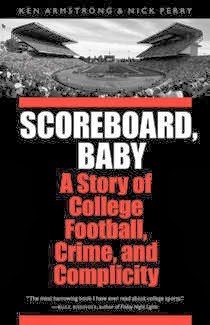 Scoreboard, Baby: A Story of College Football, Crime, and Complicity by Ken Armstrong and Nick Perry
Scoreboard, Baby: A Story of College Football, Crime, and Complicity by Ken Armstrong and Nick Perry
Though it tackles probably some of the harshest stuff on the OBCB list, Armstrong and Perry's book was one of -- if not the -- best books I read while serving on committee. It's one I found by accident while seeking out anything sports-themed that might have a tie-in to what people are aware of in the sports world socially today.
This is a piece of investigative journalism that began as a news story in Seattle and blossomed out into a full blown book that's incredibly compelling, fascinating, and disturbing. The book follows the University of Washington's football team in 2000 as players are accused of committing a series of crimes, including rape, drug possession, attempted murder, and more. And while those crimes are the story, what's at the heart of the book is how the players on this team managed to get away from all of those things and not have their personal lives impact their reputations as heroes. This isn't a book about how they overcame adversity; it's a book about why the things they did were purposefully overlooked, buried, or otherwise ignored by the media at the time and why and how it is that even now, over a decade later, those things they've been convicted and charged with have no bearing on their reputations or their status as football heroes.
How was it possible that the school, the local police, and the media kept these things quiet? It's because of what football is and the power it holds.
What's worth mentioning about this book, too, is that it's not just the criminals who have page time here. It's the victims, as well as those who really did need football in their lives to get on the right track. The girl who is at the center of the rape story has a voice in this book, and I found that particularly powerful, as well as particularly hard to read. We see what that crime actually does to her and her future -- not just that her rapist manages to avoid having his reputation marred by it, but her experience at school is not any longer an experience that belongs to her. Likewise, there are stories here about the players whose lives changed because of football in a good way. It helped give them drive and purpose, and it allowed them to find themselves in an otherwise scary place at the university.
Anyone interested in politics, in investigative journalism, and in crime or criminology will be fascinated by this, whether they love football or not. And readers who love football but may be less invested in the social and cultural aspects will find the writing about the game itself to be compelling. Perhaps the thing I took away from this book most was not just the fact that it is still relevant today, but many of the names of the players involved in these stories are not only still playing in the big leagues today, but some of them have gone on to be big in the big leagues...and these incidents are still ignored or denied.
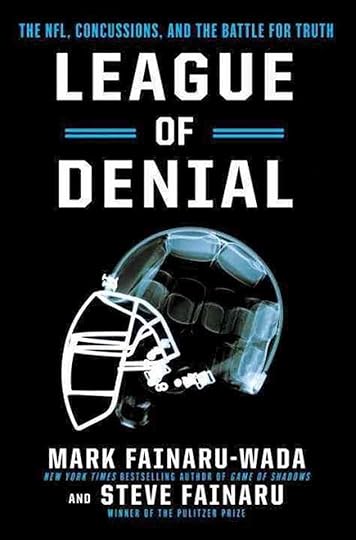 League of Denial: The NFL, Concussions, and the Battle for Truth by Mark Fainaru-Wada and Steve Fainaru
League of Denial: The NFL, Concussions, and the Battle for Truth by Mark Fainaru-Wada and Steve Fainaru
Fainaru-Wada and Fainaru's book is on the science and technology list within the OBCB, and I haven't read it in full. It had originally been nominated in another category, and I read the first fifty pages before suggesting it switch over.
But what I can say about this book aside from it being very readable is that it's a little bit about football, a little bit about football culture, a little bit about sports medicine, a little bit about concussions and injuries sustained during football, and a little about how big sports managed to deny and hide the fact that injuries sustained while playing could have brain -- and thereby life -- altering consequences on players.
Can science show evidence that a problem exists and if so, if a big organization chooses to deny that evidence, who gets the final word? Which one has more power and more believability? What about the players whose lives have been changed, not to mention had their careers ended, because of injuries they got on the field? The NFL is a huge and powerful organization, and even in the wake of a pile of evidence, their power to deny says a lot.
Since I can't talk much more detail about the book because I haven't read it in full, I suggest spending a little time with the PBS Frontline report and story about League of Denial. I'd be willing to bet that teens who find this report interesting will be eager to pick up the book (and not just teens, but adults, as well, since our list is broad in scope and audience).
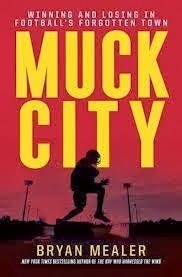 Muck City by Bryan Mealer
Muck City by Bryan Mealer
Mealer's title appears on the arts and humanities list within the OBCB, and that's because the biggest take away from this book is that football is human. What I mean by that is that it has the power to impact people's lives in a way that goes beyond politics, beyond the culture of responsibility or deniability, and beyond even what it means to win or lose a game.
Set in Belle Glade, Florida, Muck City is about how high school football can become the heart of a city when there needs to be something positive within a broken-down place. I'm not familiar with Florida, aside from my image of beaches and resorts, so sitting down and being put into Belle Glade, which is a poor, broken, dying, crime-ridden town. For more perspective on Belle Glade, it's often referred to as Muck City because of it's high concentration of muck, which is what helps sugarcane grow. More than that, Belle Glade is known for having one of the highest concentrations of AIDS infections per capita in the United States -- while that statistic is older, it should give a picture of what this community looks and runs like.
The other thing to know about Belle Glade is that it's also known for sending on a huge number of its high school players to the NFL, with a good number drafted in the first round. Football is one thing that community rallies around, but even more than rallying around their high school's team, football is a way out of the community for many of its players who have grown up knowing no certainty in their future.
Mealer's book follows three people. There's coach Jessie Hester, who was Muck City's first first star and comes back not to just win championships but to make a huge impact on the kids who he sees through the program. Mario Rowley is the team's quarterback, and he's driven by the need to win in order to make his parents -- who aren't alive anymore -- proud and to move beyond a string of things in his life that keep holding him back. Football is his ticket out of town, too, if he's good enough. Then there's Jonteria Williams, head cheerleader for the team, who wants to get out of Belle Glade and become a doctor. The problem is she needs a scholarship to make it happen, and she pushes herself to the brink in order to help realize this dream.
This is the book to hand to readers who love drama with their personal stories of triumph and adversity. Which sounds really cheesy and reductive, but it's the easiest way to sell this book to readers. It's about football and there's a lot of football in it, but it's a lot more about what it's like to grow up in a rough, unforgiving environment and still find things that interest you and make you find a passion and desire in your life.
In many ways, Muck City is football culture on the microlevel in a way that the other two books are football culture on the macrolevel. Together, these three explorations of football manage to look at the big picture -- the politics and structure of the system -- while also looking at the smaller one -- how and why we care and love the game itself.







 Related StoriesA Year in Committee LifeReligion & Religious Memoirs: Reviews From the OBCB ListAnnie Sullivan and the Trials of Helen Keller by Joseph Lambert
Related StoriesA Year in Committee LifeReligion & Religious Memoirs: Reviews From the OBCB ListAnnie Sullivan and the Trials of Helen Keller by Joseph Lambert
As you may or may not know, last week, NFL football prospect Michael Sam came out about his sexuality in advance of the draft. The decision to own who he is in anticipation of achieving his own goals of being drafted to the big league is something worth talking and thinking about. Football has a culture surrounding it, and that culture is why Sam's coming out is such a huge deal: it's not something generally talked about, let alone embraced.
One of the things we were looking for on OBCB and something we talked a great deal about was getting sports-related books onto our lists in some capacity. It turns out we had three football titles, each in a separate category, and each one of them looks at the culture of football in some way. Though none touch on what we're seeing right now in the media with Sam and his decision to come out, part of why these three books made the lists is because they're things that we haven't seen talked about in the media. And though it sounds like they're all downers or they're unnecessarily harsh on football and sports culture, they're not. They do shed light into the dark side of the sport, but all pay respect to what football is, why people love it, and why people want to play it. Readers seeking good sports books will find these three showcase very different things and do so in a way that respects the game.
 Scoreboard, Baby: A Story of College Football, Crime, and Complicity by Ken Armstrong and Nick Perry
Scoreboard, Baby: A Story of College Football, Crime, and Complicity by Ken Armstrong and Nick PerryThough it tackles probably some of the harshest stuff on the OBCB list, Armstrong and Perry's book was one of -- if not the -- best books I read while serving on committee. It's one I found by accident while seeking out anything sports-themed that might have a tie-in to what people are aware of in the sports world socially today.
This is a piece of investigative journalism that began as a news story in Seattle and blossomed out into a full blown book that's incredibly compelling, fascinating, and disturbing. The book follows the University of Washington's football team in 2000 as players are accused of committing a series of crimes, including rape, drug possession, attempted murder, and more. And while those crimes are the story, what's at the heart of the book is how the players on this team managed to get away from all of those things and not have their personal lives impact their reputations as heroes. This isn't a book about how they overcame adversity; it's a book about why the things they did were purposefully overlooked, buried, or otherwise ignored by the media at the time and why and how it is that even now, over a decade later, those things they've been convicted and charged with have no bearing on their reputations or their status as football heroes.
How was it possible that the school, the local police, and the media kept these things quiet? It's because of what football is and the power it holds.
What's worth mentioning about this book, too, is that it's not just the criminals who have page time here. It's the victims, as well as those who really did need football in their lives to get on the right track. The girl who is at the center of the rape story has a voice in this book, and I found that particularly powerful, as well as particularly hard to read. We see what that crime actually does to her and her future -- not just that her rapist manages to avoid having his reputation marred by it, but her experience at school is not any longer an experience that belongs to her. Likewise, there are stories here about the players whose lives changed because of football in a good way. It helped give them drive and purpose, and it allowed them to find themselves in an otherwise scary place at the university.
Anyone interested in politics, in investigative journalism, and in crime or criminology will be fascinated by this, whether they love football or not. And readers who love football but may be less invested in the social and cultural aspects will find the writing about the game itself to be compelling. Perhaps the thing I took away from this book most was not just the fact that it is still relevant today, but many of the names of the players involved in these stories are not only still playing in the big leagues today, but some of them have gone on to be big in the big leagues...and these incidents are still ignored or denied.
 League of Denial: The NFL, Concussions, and the Battle for Truth by Mark Fainaru-Wada and Steve Fainaru
League of Denial: The NFL, Concussions, and the Battle for Truth by Mark Fainaru-Wada and Steve FainaruFainaru-Wada and Fainaru's book is on the science and technology list within the OBCB, and I haven't read it in full. It had originally been nominated in another category, and I read the first fifty pages before suggesting it switch over.
But what I can say about this book aside from it being very readable is that it's a little bit about football, a little bit about football culture, a little bit about sports medicine, a little bit about concussions and injuries sustained during football, and a little about how big sports managed to deny and hide the fact that injuries sustained while playing could have brain -- and thereby life -- altering consequences on players.
Can science show evidence that a problem exists and if so, if a big organization chooses to deny that evidence, who gets the final word? Which one has more power and more believability? What about the players whose lives have been changed, not to mention had their careers ended, because of injuries they got on the field? The NFL is a huge and powerful organization, and even in the wake of a pile of evidence, their power to deny says a lot.
Since I can't talk much more detail about the book because I haven't read it in full, I suggest spending a little time with the PBS Frontline report and story about League of Denial. I'd be willing to bet that teens who find this report interesting will be eager to pick up the book (and not just teens, but adults, as well, since our list is broad in scope and audience).
 Muck City by Bryan Mealer
Muck City by Bryan MealerMealer's title appears on the arts and humanities list within the OBCB, and that's because the biggest take away from this book is that football is human. What I mean by that is that it has the power to impact people's lives in a way that goes beyond politics, beyond the culture of responsibility or deniability, and beyond even what it means to win or lose a game.
Set in Belle Glade, Florida, Muck City is about how high school football can become the heart of a city when there needs to be something positive within a broken-down place. I'm not familiar with Florida, aside from my image of beaches and resorts, so sitting down and being put into Belle Glade, which is a poor, broken, dying, crime-ridden town. For more perspective on Belle Glade, it's often referred to as Muck City because of it's high concentration of muck, which is what helps sugarcane grow. More than that, Belle Glade is known for having one of the highest concentrations of AIDS infections per capita in the United States -- while that statistic is older, it should give a picture of what this community looks and runs like.
The other thing to know about Belle Glade is that it's also known for sending on a huge number of its high school players to the NFL, with a good number drafted in the first round. Football is one thing that community rallies around, but even more than rallying around their high school's team, football is a way out of the community for many of its players who have grown up knowing no certainty in their future.
Mealer's book follows three people. There's coach Jessie Hester, who was Muck City's first first star and comes back not to just win championships but to make a huge impact on the kids who he sees through the program. Mario Rowley is the team's quarterback, and he's driven by the need to win in order to make his parents -- who aren't alive anymore -- proud and to move beyond a string of things in his life that keep holding him back. Football is his ticket out of town, too, if he's good enough. Then there's Jonteria Williams, head cheerleader for the team, who wants to get out of Belle Glade and become a doctor. The problem is she needs a scholarship to make it happen, and she pushes herself to the brink in order to help realize this dream.
This is the book to hand to readers who love drama with their personal stories of triumph and adversity. Which sounds really cheesy and reductive, but it's the easiest way to sell this book to readers. It's about football and there's a lot of football in it, but it's a lot more about what it's like to grow up in a rough, unforgiving environment and still find things that interest you and make you find a passion and desire in your life.
In many ways, Muck City is football culture on the microlevel in a way that the other two books are football culture on the macrolevel. Together, these three explorations of football manage to look at the big picture -- the politics and structure of the system -- while also looking at the smaller one -- how and why we care and love the game itself.







 Related StoriesA Year in Committee LifeReligion & Religious Memoirs: Reviews From the OBCB ListAnnie Sullivan and the Trials of Helen Keller by Joseph Lambert
Related StoriesA Year in Committee LifeReligion & Religious Memoirs: Reviews From the OBCB ListAnnie Sullivan and the Trials of Helen Keller by Joseph Lambert
Published on February 19, 2014 22:00



